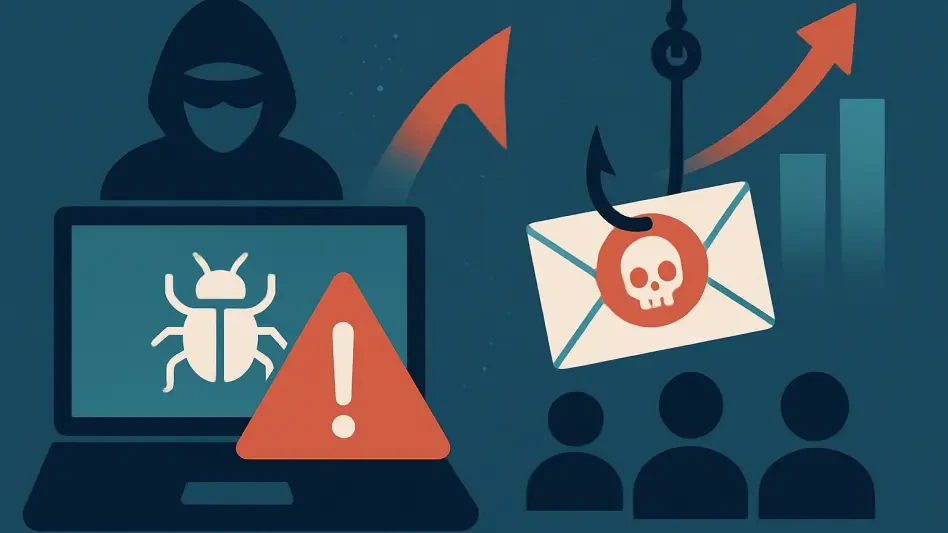What happens when an email promising $2,000 for a brief podcast interview with a celebrity lands in a corporate inbox? At first glance, it seems like a dream opportunity for any executive or business owner eager to boost their brand. Yet, this seemingly golden ticket could be a cleverly disguised trap, designed to infiltrate sensitive systems and wreak havoc on unsuspecting companies. This emerging cyber threat, known as the “podcast imposter” scam, is catching businesses off guard with its deceptive allure.
The significance of this issue cannot be overstated in today’s digital landscape, where trust is often the weakest link in cybersecurity. Scammers posing as managers of fictitious celebrity podcasts are targeting not just individuals but also high-value corporate targets. A single lapse in judgment can lead to compromised accounts, stolen data, and severe financial losses. With businesses increasingly reliant on digital platforms, understanding and combating this scam is critical to safeguarding operations and reputations.
A Tempting Offer or a Dangerous Trap?
The bait is almost irresistible: a polished email lands unexpectedly, offering a substantial payment for a quick interview on a celebrity podcast. For busy executives or influencers, this appears as a rare chance to gain exposure while earning easy money. However, the catch lies in the fine print—or rather, the hidden intent behind the message, which often masks a sinister plot to exploit trust.
Beneath the surface, these offers are often the first step in a sophisticated cyber scheme. Fraudsters craft their outreach with just enough detail to seem legitimate, banking on curiosity to drive a response. Once contact is made, the trap tightens, pulling victims into a web of deceit that can compromise both personal and professional security.
This growing menace highlights a critical vulnerability in how digital communications are perceived. Many recipients fail to question the authenticity of such unsolicited offers, especially when a celebrity name or financial incentive is attached. The allure of fame and profit often overshadows the need for caution, making this scam a potent weapon in the hands of cybercriminals.
Why Podcast Scams Are a Rising Threat to Businesses
In the current digital era, cybercriminals have shifted focus from brute-force hacking to manipulating human behavior. Social engineering tactics, like the podcast imposter scam, exploit trust rather than technology, making them harder to detect with traditional security measures. This trend represents a significant challenge for companies that may not prioritize training against such psychological ploys.
Reports indicate that these scams are no longer just a nuisance for individuals; they pose a direct threat to corporate environments. Executives and specialists, whose accounts often hold the keys to broader company systems, are prime targets. A breach at this level can cascade into widespread damage, affecting everything from financial records to client data.
The stakes are alarmingly high, as the cost of a single incident can spiral into millions in losses and irreparable harm to a brand’s reputation. With businesses leaning heavily on online tools for operations, the risk of falling prey to such deception has intensified. This evolving threat demands a reevaluation of how cybersecurity is approached within organizations of all sizes.
How the Podcast Imposter Scam Operates and Targets Victims
The podcast imposter scam unfolds with chilling simplicity, starting with an unsolicited email that dangles a $2,000 payment for a podcast appearance. Victims who bite are soon engaged in a follow-up call, supposedly to test their technology setup. During this interaction, scammers request remote access to the device under the guise of troubleshooting, a move that opens the door to harvesting sensitive information.
Once access is granted, fraudsters can steal login credentials, often targeting social media accounts as an entry point. The danger escalates if passwords are reused across platforms, potentially exposing professional systems tied to the same credentials. This method proves devastatingly effective, as it preys on a willingness to cooperate without verifying the requester’s legitimacy.
While influencers have historically been frequent targets, a troubling shift has emerged toward corporate executives. These high-value individuals offer scammers a gateway to infiltrate entire business networks, amplifying the potential impact. The deliberate focus on such targets underscores the calculated nature of these attacks, aiming for maximum disruption and gain.
Expert Perspectives on an Evolving Cyber Threat
Cybersecurity specialist Martin Kraemer from KnowBe4 likens this scam to a modernized version of the old tech support fraud, but with a sharper edge aimed at corporate spheres. “The blend of celebrity allure and promised money taps directly into human curiosity, making it a powerful tool for deception,” Kraemer explains. This insight reveals how deeply these tactics exploit psychological triggers over technical flaws.
Further warnings emphasize that social engineering is outstripping traditional cyber exploits in both frequency and impact. Real-world incidents, where executives have unknowingly handed over access during seemingly legitimate calls, serve as stark reminders of the scam’s potency. Such cases illustrate why awareness must extend beyond IT departments to every level of an organization.
The consensus among experts is clear: the sophistication of these scams demands a cultural shift in how digital interactions are handled. Relying solely on antivirus software or firewalls is no longer sufficient when the primary vulnerability lies in human judgment. This evolving landscape calls for a proactive stance to stay ahead of increasingly cunning cybercriminals.
Steps to Shield Your Business from Podcast Scams
Protecting a business from podcast imposter scams starts with a mindset of skepticism toward unsolicited communications. Emails that promise quick money or feature odd formatting should raise immediate red flags. A simple but effective check is to scrutinize the sender’s email address—credible organizations rarely use free services like Gmail for official outreach.
Beyond initial caution, several practical measures can fortify defenses. Never accept monetary offers without thorough verification, and under no circumstances should remote access to devices be granted to unknown parties. Additionally, safeguarding personal and professional information must be a non-negotiable priority, ensuring that even if one layer of security fails, others remain intact.
Expert advice underscores the value of continuous education in this fight. Regular cybersecurity training can equip employees to spot and resist phishing attempts and other social engineering tricks. By fostering a culture of vigilance and implementing these actionable steps, businesses can significantly reduce the risk of falling victim to such deceptive schemes.
Reflecting on a Persistent Digital Danger
Looking back, the podcast imposter scam stood as a stark warning of how cybercriminals adapted to exploit trust in an increasingly connected world. The ingenuity of these fraudsters, who masked their intent behind the glamour of celebrity and financial gain, caught many off guard. Each incident served as a lesson in the importance of questioning even the most enticing digital offers.
The path forward demanded more than just reactive measures; it required a commitment to ongoing education and robust security protocols. Businesses had to prioritize training programs that empowered employees to recognize subtle signs of deception. Investing in such initiatives proved essential to building resilience against ever-evolving threats.
Ultimately, the fight against these scams hinged on a collective resolve to stay informed and cautious. Strengthening defenses meant not only adopting recommended practices but also fostering an environment where skepticism was a valued asset. As digital deception continued to morph, this proactive mindset became the cornerstone of protecting both individual and corporate interests.








